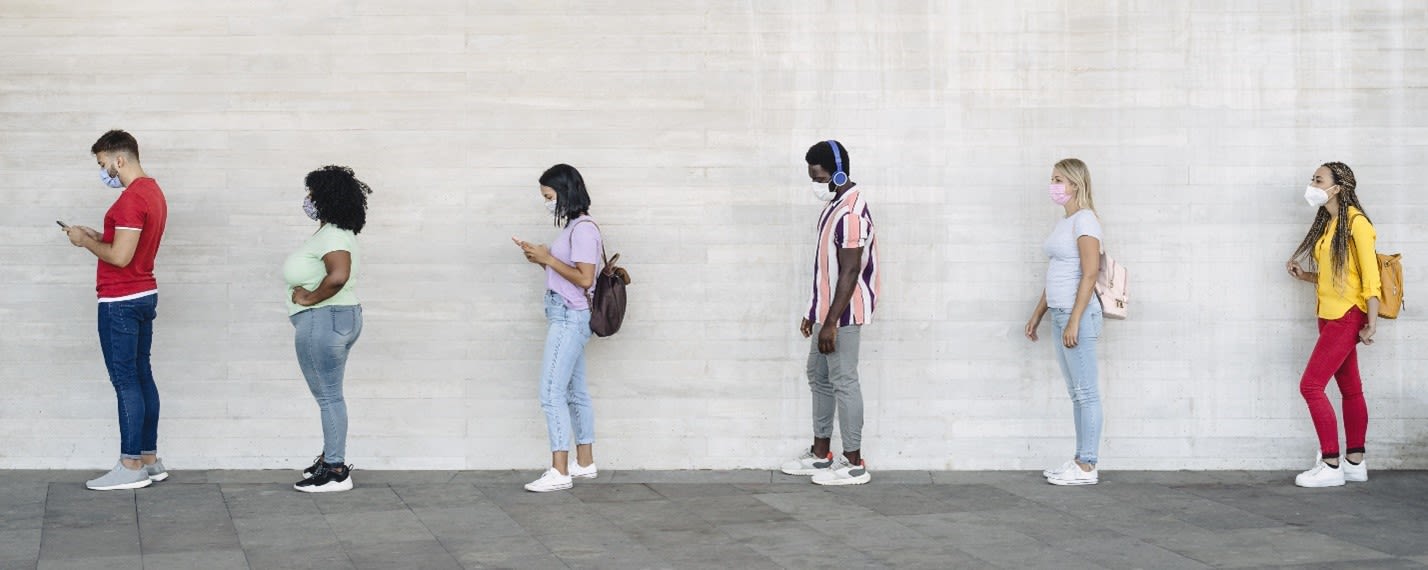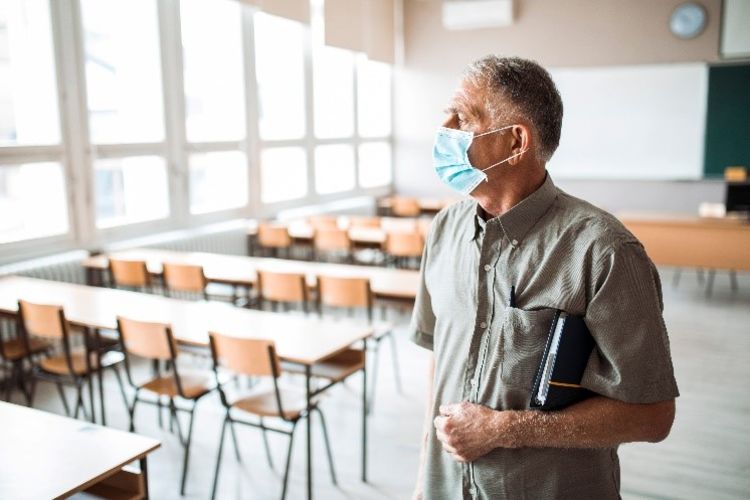Coronavirus has devastated
the college experience
New strategies and diagnostic capabilities can help academia rebound

The current state of higher education
As academic campuses canceled in-person classes throughout 2020, the public saw shuttered classrooms, rescinded programs and burgeoning remote learning options to match rising infection rates around the world. Moving into 2021, both public and private institutions are working hard to manage the effects of the pandemic.
We have yet to comprehend the long-term impact of the current instability across campuses. From declining enrollment and postponed athletic seasons to decreased student engagement and professor burnout, the pandemic has threatened nearly every aspect of academic life. Gap years and non-returning students abound, all to the detriment of the student community, the staff, the university and its bottom line.
Driven by visions from the virtual experience during the past year, universities are now focusing on ways to maximize in-person learning. Strategists are rethinking how campuses and individual classrooms will look, creating smaller classes and increasing SARS-CoV-2 testing to work within the spare budgets that remain.
How can academic institutions create a safe and effective space for students going forward? This is a crucial turning point for colleges—to take what they have learned and fight harder to manage and restore high-value education.

What a difference a year makes
Colleges across the nation, even those that had success in keeping students in the classroom last fall, are continuing to experience the impact of coronavirus cases as we enter into 2021. This has been attributed to higher rates of transmission from new SARS-CoV-2 variants as well as from fatigue among communities as students and teachers alike grow weary of their current circumstances.
Compounding considerations for opening campuses in spring are operating deficits spurred by enrollment challenges, discounted tuition and continued investment in COVID-19 related modifications. Severe budget cuts have resulted in an unprecedented impact on jobs as well as on quality of education in the form of eliminating academic programs or courses of study and reducing research options for interested students.
To help balance budget cuts, colleges and universities implemented hiring freezes and furloughs that plagued faculty and staff. The events and additional job losses in academia have created an increasingly stressful environment. A recent survey of academic faculty demonstrated an overwhelming rise in chronic stress and job burnout. Notably, faculty struggle with online instruction: Professors are expected to create curricula that accommodate both in-person and online education, manage new guidelines for in-person activities and resume disrupted research programs.

Strategic thinking using solutions for scaling testing
To prevent infection rates from spiking, entry-testing all students when they arrive on campus has helped identify positive cases and prevent initial spread from returning students. Following this with regular testing involves pooled testing to reduce materials use and scalable approaches for high-throughput and sensitivity. The effort supports a healthy environment by detecting infections early and stopping their spread in school settings.
After quelling an initial surge in infections at the beginning of the school year, the University of Illinois at Urbana-Champaign has been able to maintain positivity rates under 1%. A significant factor in its success appears to be twice-a-week mandatory testing using a noninvasive and convenient saliva-based testing strategy. The university has become an example to higher education that students and faculty can stay safely on campus.
At the start of the pandemic, scientists at the McDonnell Genome Institute and the Department of Genetics at Washington University School of Medicine in St. Louis saw an opportunity to collaborate with Fluidigm, a biotechnology tools provider, to develop a new saliva-based COVID-19 test, solving several issues with current testing options. Answering the demand for a convenient, high-capacity testing approach, the team created a high-throughput saliva test using Fluidigm® microfluidics technology.
Although testing has been a widely confirmed key strategy to manage the spread of coronavirus, many institutions face constraints due to associated costs and access. Well-resourced schools tend to offer more frequent weekly testing, while larger public institutions have a lower capacity and might test only those who show symptoms or who volunteer.
Fluidigm offers a unique program for colleges and universities, empowering them to test their student community and staff suspected of COVID-19 by a healthcare provider with the Advanta™ Dx SARS-CoV-2 RT-PCR Assay. The company’s COVID-19 Campus Safeguard Program offers easy-to-use saliva-based tests for students, faculty and staff at an academic rate, supporting a healthy campus by scaling testing for classes, activities and university housing. The noninvasive saliva test, which can process hundreds to thousands of samples in one day on one system, addresses the pressing need for ongoing, accessible testing and for a significant reduction in materials waste, while circumventing supply chain constraints that other tests are vulnerable to.
“Fluidigm is grateful for the opportunity to enable simple, affordable and accessible testing to help keep colleges and universities open and their staffs and students healthy,” said Chris Linthwaite, Fluidigm President and CEO. “We are proud of our collaborations with a number of higher education institutions to provide a test with a sample type that is far easier to collect than invasive swabs, and that individuals often prefer from a comfort perspective.”

Using saliva samples for more convenient and expansive testing
George Mason University (GMU) recently stepped up its prevention program to implement weekly saliva testing of on-campus students as well as random surveillance testing of all students, faculty and staff suspected of COVID-19 by a healthcare provider. University of South Carolina and University of Georgia are expanding their testing capacity using saliva testing to maintain in-person classes and ongoing activities. These enormous efforts by universities not only help on-campus success but also limit community spread beyond university doors.
“Frequent and reliable testing is the core of our plan to keep students and staff safe at GMU,” said Ali Andalibi, PhD, Professor and Senior Associate Dean in the College of Science at GMU. “Adoption of the Advanta Dx SARS-CoV-2 RT-PCR Assay is one element of a plan to greatly expand our capacity. The noninvasive nature of the assay, accuracy and time to results are among key advantages of the Fluidigm system, which we have combined with an automation platform for testing at scale.”
In a new study, The Journal of the American Medical Association Internal Medicine conducted a systematic review of saliva testing for SARS-CoV-2 detection and COVID-19 diagnosis compared to nasopharyngeal swab tests. Analysis of several recent publications demonstrated diagnostic sensitivity for saliva samples comparable to that reported for nasopharyngeal swabs. With the ease of sample collection and higher level of patient comfort, the authors urge academic testing centers to strongly consider adopting saliva testing over nasopharyngeal swabs.
The Advanta Dx SARS-CoV-2 RT-PCR Assay can enhance testing coverage in critical populations and encourage a higher participation rate in opt-in testing with a more comfortable collection method. Saliva-based collection can be done easily by the patient, reducing the staffing and protective gear requirements of nasopharyngeal testing and the acute discomfort of sample collection.
The pandemic has had far-reaching implications on academic research, career trajectories of professors, student aspirations to continue their current programs and overall views on the future of higher education. However, academia can recover from the devastation that COVID-19 has caused. Universities that are revising prevention strategies to include increased testing capacity, taking a thoughtful approach to choosing saliva-based COVID-19 testing and considering options to maximize in-person learning and improve professional expectations are off to a good start.

Intended Use
The Advanta™ Dx SARS-CoV-2 RT-PCR Assay is a real-time Reverse Transcription (RT) PCR test intended for the qualitative detection of nucleic acid from the SARS-CoV-2 in saliva specimens collected without preservatives in a sterile container from individuals suspected of COVID-19 by their healthcare provider. Testing is limited to Laboratories which are certified under the Clinical Laboratory Improvement Amendments of 1988 (CLIA), 42 U.S.C. §263a, and meet requirements to perform high complexity tests.
Results are for the identification of SARS-CoV-2 RNA. The SARS-CoV-2 RNA is generally detectable in saliva specimens during the acute phase of infection. Positive results are indicative of the presence of SARS-CoV-2 RNA; clinical correlation with patient history and other diagnostic information is necessary to determine patient infection status. Positive results do not rule out bacterial infection or co-infection with other viruses. The agent detected may not be the definite cause of disease. Laboratories within the United States and its territories are required to report all results to the appropriate public health authorities.
Negative results do not preclude SARS-CoV-2 infection and should not be used as the sole basis for patient management decisions. Negative results must be combined with clinical observations, patient history, and epidemiological information. Negative results for SARS-CoV-2 RNA from saliva should be confirmed by testing of an alternative specimen type if clinically indicated.
The Advanta™ Dx SARS-CoV-2 RT-PCR Assay is intended for use by qualified and trained clinical laboratory personnel specifically instructed and trained in the techniques of real-time PCR and in vitro diagnostic procedures. The Advanta™ Dx SARS-CoV-2 RT-PCR Assay is only for use under the Food and Drug Administration's Emergency Use Authorization.
The Advanta Dx SARS-CoV-2 RT-PCR Assay is for In Vitro Diagnostic Use. It is for Use Under Emergency Use Authorization Only. Rx Only. It has not been FDA cleared or approved. It has been authorized by FDA under an EUA for use by authorized laboratories. It has been authorized only for the detection of nucleic acid from SARS-CoV-2, not for any other viruses or pathogens. It is only authorized for the duration of the declaration that circumstances exist justifying the authorization of emergency use of in vitro diagnostics for detection and/or diagnosis of COVID-19 under Section 564(b)(1) of the Act, 21 U.S.C. § 360bbb-3(b)(1), unless the authorization is terminated or revoked sooner. Other Fluidigm products are For Research Use Only. Not for use in diagnostic procedures.
This content was paid for and created by FLUIDIGM. The editorial staff of The Chronicle had no role in its preparation. Find out more about paid content.



